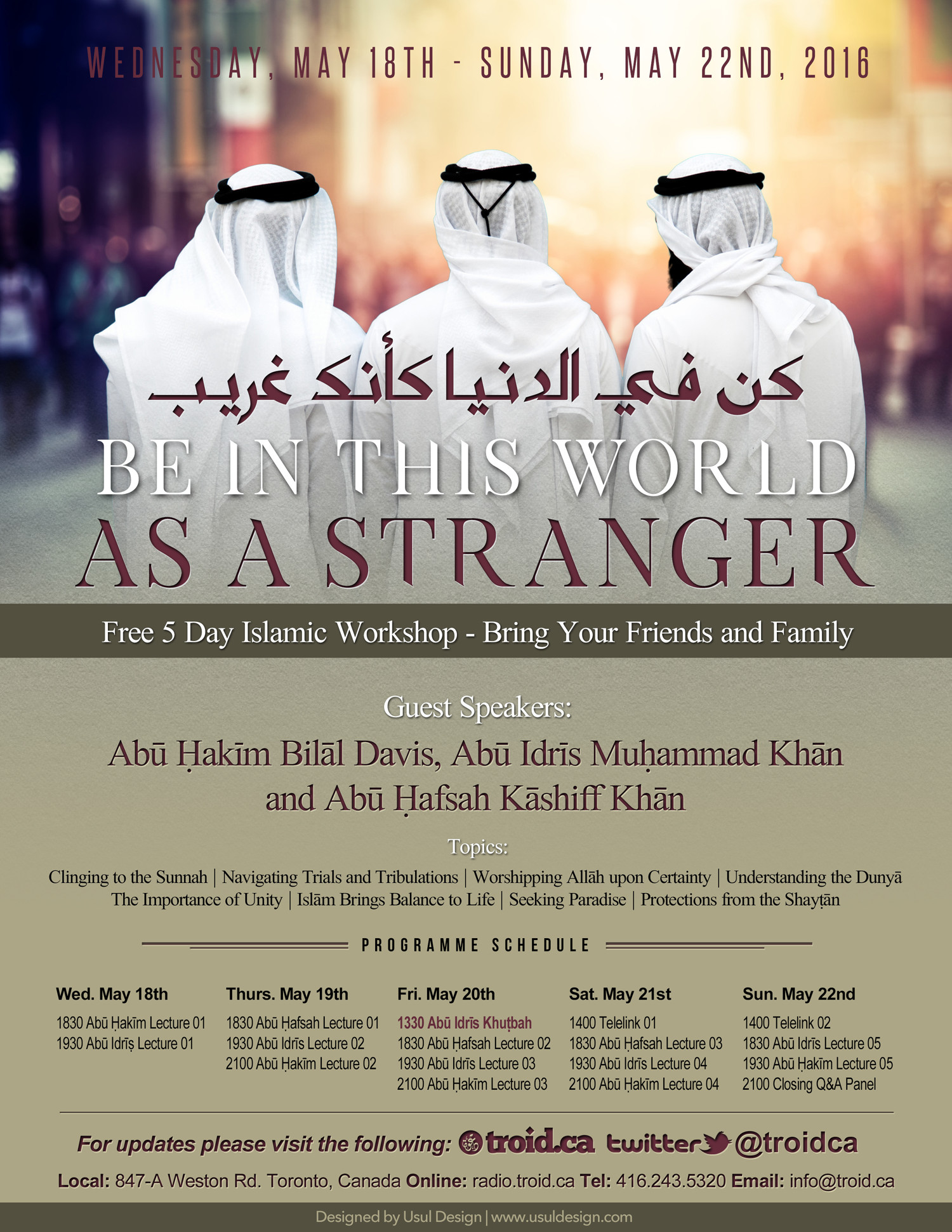This highly informative and beneficial lecture series delivered by our noble brother Abū Ḥafsah Kāshif Khān, goes through Shaykh Muḥammad ibn Ṣāliḥ al-ʿUthaymīn’s explanation of Riyāḍh al-Ṣāliḥīn, the chapter: The Excellence of Zuhd (abstinence from the dunyā), An Enticement Upon Limiting Oneself Within it and The Excellence of Poverty,’ in which Imām al-Nawawī mentions a number of āyat from the Qurʾān which the noble Shaykh expounds upon.
The topic of the dawrah (seminar) is based upon the ḥadīth collected by al-Bukhārī and narrated by ʿAbd-Allāh ibn ʿUmar (raḍī Allāhu ʿʿʿanhu) ‘Be in this world as though you are a stranger or a wayfarer.’ This is a Ḥadith which should be well known to the one who has studied or read the 40 Ḥādīth of Imām al-Nawawī (raḥimahullāh), and it is the 40th Ḥadith in this book.
ʿAbd-Allāh ibn ʿUmar (raḍī Allāhu ʿʿʿanhu) was from the youth of the Ṣaḥābah, and he begins this Ḥadīth by saying, ‘Indeed the Messenger of Allāh took me by my shoulders…’ Herein two points of benefit can be derived through the way in which the Messenger of Allāh advised this young Companion, firstly the manner in which he took him by the shoulders. The Messenger of Allāh (ṣallallāhu ʿalayhi wa-sallam) then said ‘Be in this world as though you are a stranger or a wayfarer.’ The second point of benefit can be found in the weight of the Messenger’s words, which though they are few, are very concise, however we know that the Prophet was blessed by Allāh with concise speech, even though the benefit and meaning in the speech was abundant.
This Ḥadīth delivers a clear message to the believer, and that is that our priority in this worldly life is not to remain, because our time in this balad (land) is very short; so we partake in those affairs which will benefit our time. We do not truly belong here, thus we are strangers here for a short period. It is upon you to take what you need and get ready for your trip back home to your destination and to not preoccupy yourself with more than that.
Shaykh Muḥammad ibn Ṣāliḥ al-ʿUthaymīn mentions that the station of the traveller or wayfarer is far more superior than the stranger, and that is because the wayfarer is simply passing through, whereas the stranger has some level of remaining in that land for some time. Based upon this advice given by the Messenger of Allāh (ṣallallāhu ʿalahyī wa-sallam), ʿAbd-Allāh ibn ʿUmar (raḍī Allāhu ʿʿʿanhu) used to say, ‘If you live to see the evening, then do not wait for the morning (meaning do not leave an action you can do that evening till the morning), and if you see the morning then do not leave that action you can do for the morning till the evening, for indeed neither morning nor evening is promised to you, and death may reach you before you reach the evening or morning. So take advantage of your health before your sickness and your life before your death.’
It is known that the one who is healthy has energy and abilities which the one who is sick does not have and without doubt this is a blessing, rather it is from the greatest blessings of Allāh, so it is obligatory that you are thankful to Allāh for this blessing of health, and from this thankfulness is that you realise the blessing from Allāh in the heart, proclaim it upon the tongue and spend that blessing in the pleasure of Allāh and in obedience to Him. This important principle should be remembered and taught to your children.
In this dunyā you are faced with an abundance of time; decades, years, months, weeks, days, hours, minutes and seconds, until all that remains is death which none can escape, whether they remain a hundred years or ten years, death will overcome them. When the Prophets and Messengers were sent to their respective nations they came with the message of tawḥīd and īmān in the ākhirah, because this belief was lacking in the people, and it is a necessity of faith, to have knowledge and certainty that we will be resurrected after death. The kuffār from amongst the Quraysh were those who would say it is only the life of this world that exists, as we live, we die, and it is only time that kills us off, there is nothing after this life. Hence knowledge and certainty of knowing our purpose and the guaranteed destination of the hereafter changes the reality of a person’s relationship with this world.
So what is the relationship of the Muslim with this world? It is to know that Allāh created life and death to test those best in deeds, indeed we were dead then we were given life, and we will die and be brought to life once again and called to account for our actions. Death and life were created by Allāh as a test to see which one of you are best in your actions, the heavens and the earth were created for the same purpose life and death were created, in order to see who were best in actions. Indeed Allāh has placed adornments and beautification upon the earth to test us, and everything in this life is an item of adornment and beautification whether it is found within Allāh’s creation or what we have put forth.
No doubt, if this dunyā was empty and ragged and did not produce wealth and sustenance, then concentration on īmān and ʿibādah would be easy. However, Allāh has placed on the earth those things which when its beauty and existence are realised, you desire them. Allah informs us that he made everything upon the face of earth from the food which we eat and desire, and drink, beautiful places to live, trees, rivers, greenery of the earth and its produce, magnificent sites, horses, gold, silver, Allāh created them as an adornment for this world as a trial and tribulation.
Shaykh Muḥammad ibn Ṣāliḥ al-ʿUthaymīn explains the reason for which the dunyā was named ‘dunyā’. He says: ‘It was named dunyā, for two reasons, the first, because it is closer than the hereafter, because it precedes it, and secondly, due to its being deficient and lowly, it is nothing compared to the hereafter. The space of a riding stick in Jannah is better than the whole world and all that is in it from the beginning of it to the end of it.’ He mentions a number of āyāt, all of them clarifying that it is not befitting that a person be deceived by this dunyā, and be led astray from the purpose of his existence. It is not befitting that one is deceived by this worldly life and its boastful riches which calls the hearts and eyes to desire it, resulting in leaving off that which is the purpose of one’s creation, which is the worship of Allāh. However, it should be noted that it is not dis-praiseworthy to seek pleasures in this life, but rather what is dis-praiseworthy is when you allow the existence in this life to lead you astray from the purpose of this existence, which is the worship and remembrance of Allāh.














